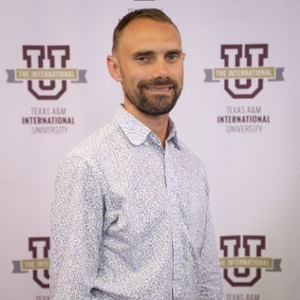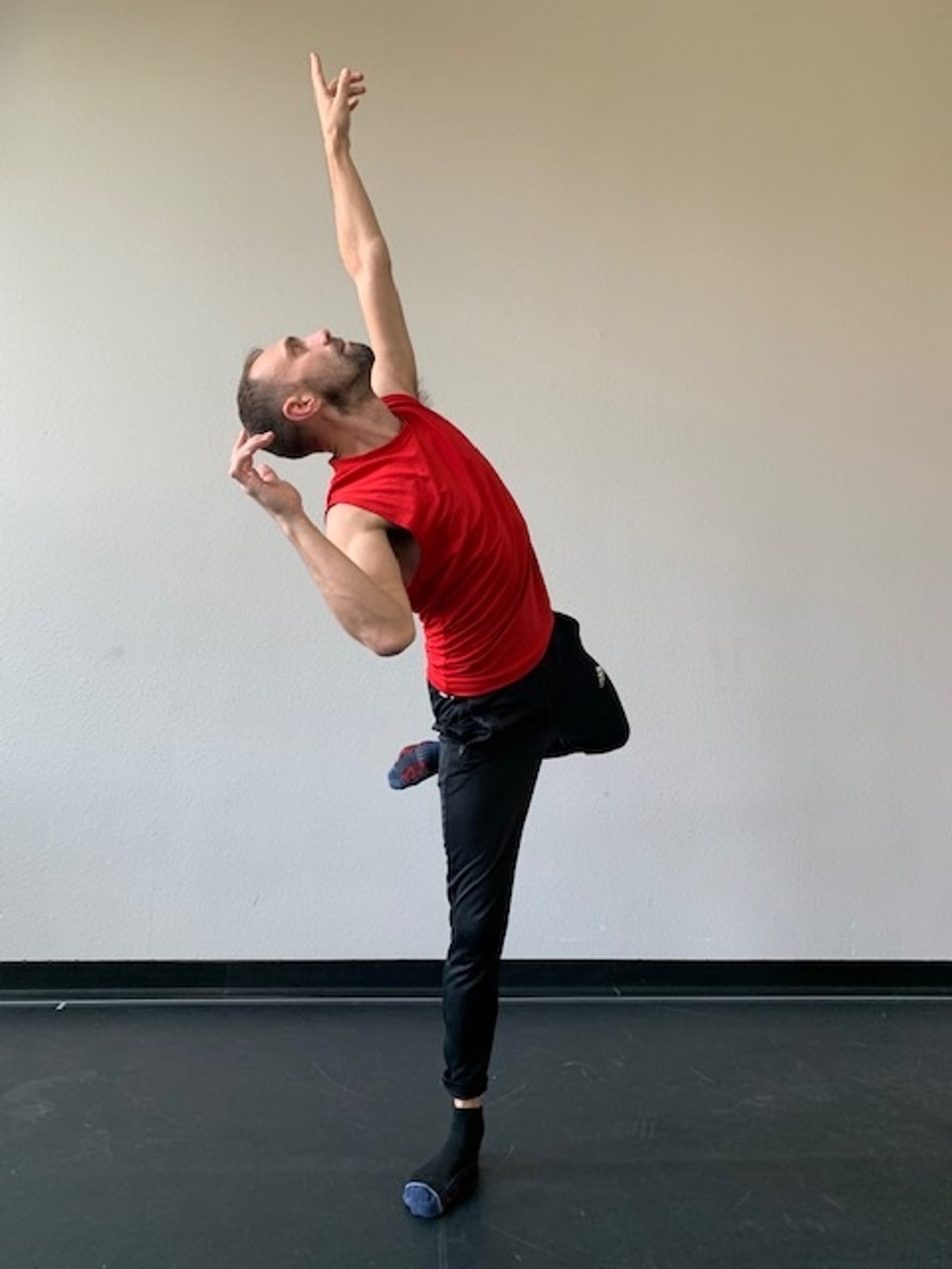Dustdevil Diversity Spotlight: Timothy Rubel

This is part of a series of interviews highlighting diversity at TAMIU. This interview features Tim Rubel, TAMIU Assistant Professor of Dance, who shares his international background, expertise and passion for Dance and Theatre and his thoughts on the importance of creating safe spaces for the LBGTQ+ community.
Living his Authentic Self and Creating Safe Spaces for Others in the LBGTQ+ Community
Tell us about yourself, where you are from and what you do here at TAMIU.
I am an Assistant Professor of Dance in the Department of Fine and Performing Arts at TAMIU. I was born in the United Kingdom, and lived in Zürich, Switzerland, where most of my extended family are from, until I was 5 years old.
I grew up primarily in Cape Cod, Mass., and have lived in other parts of the U.S. throughout my adulthood. Prior to coming to TAMIU I lived and worked in the San Francisco Bay Area, where I conduct most of my professional dance activities. I still reside in San Francisco during the Summer and Winter breaks.
When did you join TAMIU?
I began my position at TAMIU in August of 2019.
Tell us about your experience living here and being part of the Laredo community.
It took me a little while to adjust to living in Laredo. It is certainly hotter, more car-oriented , and more heteronormative than what I have been used to. However, I really appreciate Laredo's sense of community and its welcoming atmosphere. Even as an openly gay man, I have never felt unsafe. However, I do feel that there are not enough queer-focused spaces in Laredo, and that the LGBTQ+ community here needs to be empowered much more.
Tell us about your research interests and how you became interested in your area of study.
My areas of expertise are in Contemporary, Modern, and Post-Modern Dance. I began my dance training in college. I initially went to school to study Theatre Acting but became infatuated with Modern Dance in the end of my Freshman year. I continued to study both theater and dance in undergrad and then began more serious professional dance training with Fusionworks Dance Company in Providence, R.I. after college. This led to my first couple of jobs as a dancer, while I was also directing and producing theatre pieces.
Eventually, I realized that my love of dance and my theatrical aesthetic could be channeled into a choreographic practice. I decided to get my MFA in Dance with a focus on experimental choreography, from the University of California, Riverside.
While in graduate school, I became deeply interested in LGBTQ history and culture, and how dance could be a vehicle for telling our stories with authenticity, humor, and humanity. My research mainly takes the form of evening-length contemporary dance-theater pieces which ask palpable questions about human relationships from a queer perspective. I do this primarily with a performance company I founded called Tim Rubel Human Shakes, based in San Francisco.
Can you share with us the story of your advocacy work within the LGBTQ+ community and the impact it has had so far?
When I create dances with my company, queer relationships are often a prominent visual part of the work, as are stories of our lineage. As a teacher, I am completely open about who I am with my students and make it clear that my classes are safe spaces for members of the LGBTQ+ community. I am not entirely sure how to measure the impact of these actions so far. I just try to do my part each day to make our community more visible.
How has the production been received and where has it taken you?
Which production are you referring to? Just last weekend I presented a new work of mine called I Want This Instead, in San Francisco with my company. It is too early to see where this show will take me, but the initial performances were quite successful.
We had a full house on opening night, and we were well received by our audiences. We also had a notable amount of audience members who had rarely or never ever been to a Contemporary dance performance before who were truly moved by the work.
How do you feel your contributions impact TAMIU, the community and the world around you?
I hope that my work at TAMIU will encourage anyone who is in the closet about their queer identity to come out and live their truth to everyone. More broadly, I envision my work being part of larger conversations that facilitate LGBTQ+ equity around the globe. Finally, I hope to continue introducing more people to the communicative possibilities of dance.
Can you share what some of your hobbies are?
I recently discovered I love to garden. I have a few vegetable plants that are my pride and joy. I also enjoy skiing, hiking, cooking, wine, reading, learning languages, and geeking out over 70s and 80s pop stars.
Who has been your greatest inspiration and why?
There are many people who come to mind. I am inspired by people who live their truths and use it to do good in the world.
What's your proudest accomplishment to date?
Founding a professional dance company and becoming a professor.
Tell us what you are doing today academically, career or life-wise and your future plans.
Academically, I teach dance courses a semester at TAMIU, and co-produce our annual Fall and Spring Dance concerts. My colleague and I are in the process of creating the curriculum for a B.A. in Dance, which we hope to launch in the next two years or so. I am looking for opportunities to tour my work and will also premiere a new piece at TAMIU about Queer equity in February of 2022. I am looking forward to traveling internationally again sometime soon.
Why is Pride Month meaningful to you and what aspects of it would you like for everyone to know, recognize or remember?
Pride Month is a time when we celebrate the contributions and lives of queer people and honor the sacrifices many of us have made to live proudly and openly. Unfortunately, many Pride events have become very corporate in how they are presented. While I appreciate that certain corporations are affirming the lives of LGBTQ+ folks, the radical history of Pride is often lost at Pride parades. I encourage all of us to be mindful of this, and if you notice your community's Pride celebration becoming generic, do something to shake it up.
How do you think people in the LGBTQ+ community can continue to increase their visibility and impact here and in the world?
Contact your city counselors, legislators, and congressional reps, and ask them what they are doing for the LGBTQ+ community. Hold your partner(s)'s hand(s) in public. Host a Pride party. Learn and teach LGBTQ+ history.
Why do you think diversity is important at University campuses, the workplace and overall?
Diversity is fundamental to democracy. Without diverse perspectives, there will only be a limited set of interpretations of humanity, and therefore those in power will not adequately represent the public. Diversity also creates visibility, particularly of marginalized people, so that we are less likely to be the targets of fear and violence.
